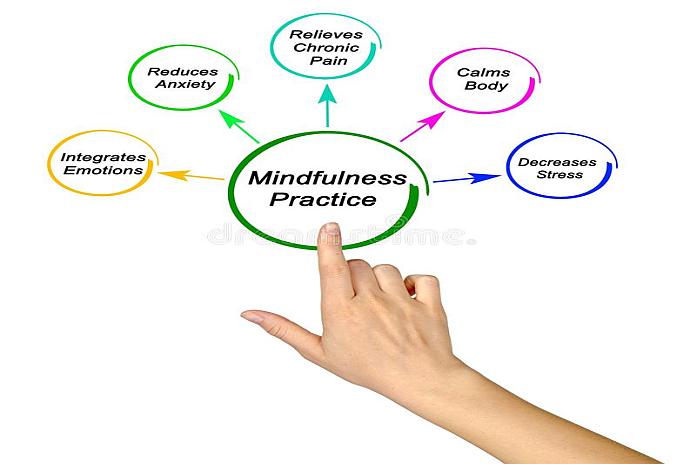By Annan Boodram – The Caribbean Voice
“It’s easy to stop noticing the world around us. It’s also easy to lose touch with the way our bodies are feeling and to end up living ‘in our heads’ – caught up in our thoughts without stopping to notice how those thoughts are driving our emotions and behaviour,” says Professor Mark Williams, former director of the Oxford Mindfulness Centre. The opposite of this, knowing directly what is going on inside and outside ourselves, moment by moment, paying more attention to the present moment – to our own thoughts and feelings, and to the world around us, is called mindfulness.
“An important part of mindfulness is reconnecting with our bodies and the sensations they experience. This means waking up to the sights, sounds, smells, and tastes of the present moment. That might be something as simple as the feel of a banister as we walk upstairs.”
Another important part of mindfulness is an awareness of our thoughts and feelings as they happen from moment to moment. “It’s about allowing ourselves to see the present moment clearly. When we do that, it can positively change the way we see ourselves and our lives.”
“Even as we go about our daily lives, we can notice the sensations of things, the food we eat, the air moving past the body as we walk,” says Professor Williams. “All this may sound very small, but it has huge power to interrupt the ‘autopilot’ mode we often engage in day today, and to give us new perspectives on life.”
Most of us have issues that we find hard to let go and mindfulness can help us deal with them more productively. We can ask: ‘Is trying to solve this by brooding about it helpful, or am I just getting caught up in my thoughts?’ Awareness of this kind also helps us notice signs of stress or anxiety earlier and helps us deal with them better.
Mindfulness is recommended by the National Institute for Health and Care Excellence (NICE) in the United Kingdom as a way to prevent depression in people who have had three or more bouts of depression in the past. The practice allows people to be present in the moment, rather than sinking into the black hole of negative thoughts, rejection, and self-criticism. This awareness ensures a more holistic response to any situation without being caught up in overwhelming or negative emotions.
As well, mindfulness-based stress reduction (MBSR), which typically includes breathing, stretching and awareness exercises have become a recognized way to help people learn to avoid distractions and increase their attention on the task in front of them.
Therapy that incorporates mindfulness can increase the quality of life by providing an increased level of mental relief for chronic pain. It allows the mind to observe the pain objectively and accept the sensation’s role in one’s life. Mindfulness can help those who live with Obsessive-Compulsive Disorder (OCD) achieve peace through a clearer mind. Practicing mindfulness also enables people to better deal with drug and alcohol addiction. As well, mindfulness has been shown to lead to better romantic relationships and better sex. In fact, it is a great tool for relationship healing and can bring about greater overall happiness.
Sarah Stewart-Brown, Professor of Public Health at the University of Warwick in the United Kingdom and a wellbeing expert, says: “Feeling happy is a part of mental wellbeing. But it’s far from the whole”. She added, “feelings of contentment, enjoyment, confidence, and engagement with the world are all a part of mental wellbeing,” as are self-esteem and self-confidence, a feeling that you can do the things you want to do, and good relationships, “which bring joy to you and those around you.”
Practicing mindfulness results in this kind of mental wellbeing. You can practice mindfulness anywhere, but it can be especially helpful to take a mindful approach if you realise that, for several minutes, you have been ‘trapped’ in reliving past problems or ‘pre-living’ future worries. Mindfulness meditation involves sitting silently and paying attention to thoughts, sounds, the sensations of breathing or parts of the body, bringing your attention back whenever the mind starts to wander.
It can be helpful to pick a regular time – the morning journey to work or a walk at lunchtime during which you decide to be aware of the sensations created by the world around you. Trying new things, such as sitting in a different seat in meetings or going somewhere new for lunch, can also help you notice the world in a new way.

Five things that, according to research, can really help to boost our mental wellbeing are:
- Connect: Connect with the people around you: your family, friends, colleagues, and neighbours. Spend time developing these relationships.
- Be active: You don’t have to go to the gym. Take a walk, go cycling, play a game, draw, sing… find any activity that you enjoy and make it a part of your life.
- Keep learning: Learning new skills can give you a sense of achievement and new confidence. So why not sign up for that cooking course, start learning to play a musical instrument, figure out how to fix your bike or repair broken furniture or torn clothing?
- Give to others: Even the smallest act can counts, whether it’s a smile, a thank you, a kind word, helping an elderly person cross the road, carrying bags for a pregnant woman or stopping to chat with a lonely person. Larger acts, such as volunteering at your local community centre, school or hospital can improve your mental wellbeing and help you build new social networks.
- Be mindful: Be more aware of the present moment, including your thoughts and feelings, your body and the world around you.
“Some people find it very difficult to practice mindfulness. As soon as they stop what they’re doing, lots of thoughts and worries crowd in,” says Professor Williams. “It might be useful to remember that mindfulness isn’t about making these thoughts go away, but rather about seeing them as mental events. “Some people find that it is easier to cope with an over-busy mind if they are doing gentle yoga or walking.” To develop an awareness of thoughts and feelings, some people find it helpful to silently name them: “Here’s the thought that I might fail that exam”. Or, “This is anxiety”.
Of course, good mental wellbeing does not mean that you never experience feelings or situations that you find difficult. But it does mean that you feel you have the resilience to cope when times are tougher than usual. It can help to think about “being well” as something you do, rather than something you are. The more you put in, the more you are likely to get out.
“No-one can give wellbeing to you. It’s you who have to take action,” says Professor Stewart-Brown. Reminding yourself to take notice of your thoughts, feelings, body sensations and the world around you is the first step to mindfulness.





